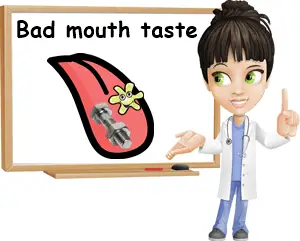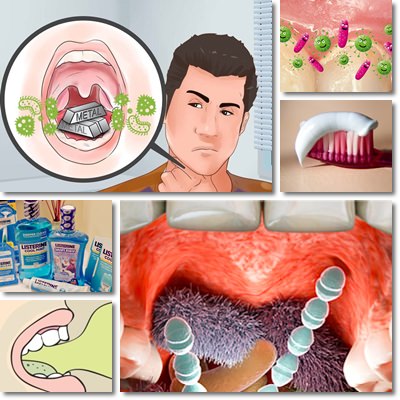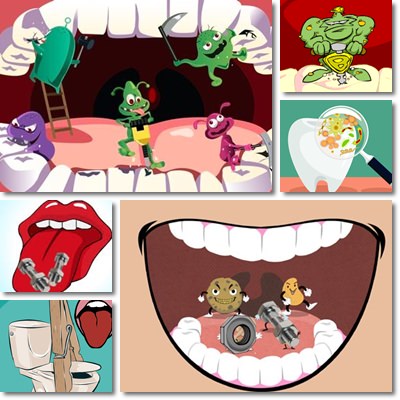Which of us hasn’t had the displeasure of experiencing a bad taste in the mouth early in the morning after waking up, after a tooth extraction or after eating certain foods we might not normally eat? Most of the times, the bad taste is either metallic or bitter and produces quite a lot of displeasure when we eat or drink something or when we just go about our day.
The bad taste can be caused by a high bacteria count in the mouth, by poor oral hygiene or tooth decay.
Diabetes, kidney or liver problems and even certain types of cancer can lead to a bad, metallic or similarly displeasing taste in our mouths.
But more serious conditions and diseases causing a bad taste in the mouth such as are rare and usually exhibit other more telling signs and symptoms that should hint at the exact medical issue behind the symptoms.
However, as innocent as we may feel this is, having a constant, recurring or reoccurring bad, metallic or similarly unpleasant taste in the mouth should concern us just enough to have it checked by a doctor.

As a golden rule, any significant change in either of our senses, be it taste, smell, sight etc. usually indicates a change in our state of health, which is best investigated by a medical professional.
Even though taste perception normally differs from person to person, we shouldn’t generally experience an unnatural or visibly unpleasant taste in the mouth.
However, mild changes in taste perception do occur naturally over time. While we are born with about 10,000 taste buds to help us enjoy the taste of food and beverages and tell which foods are good for us and which not, they are constantly renewed throughout our life, which can engender changes in our taste perception of food, beverages etc.
Moreover, as we get older, the number of taste buds in our mouth begins to decline, not to mention they shrink and become less sensitive, meaning we may not perceive taste as strongly as before. Certain people are also either more sensitive or less able to perceive a certain taste. All of these factors, and more, contribute to altering our taste perception. Nevertheless, unusual bitterness or a metallic taste reminiscent of bolts or nuts are not normal.
Bad taste in the mouth: what it’s like
Some of the most common perceptions of a bad taste in the mouth are:
- A metallic taste
- A chalky taste
- Strong bitterness
- Unusual sweetness
- A sudden salty taste
- A blood-like taste

17 Common Causes for a Bad Taste in the Mouth
Some of the most common causes for a bad, bitter, metallic or otherwise unpleasant taste in the mouth may include the following:
1- Emesis or vomiting
The act of vomiting usually leaves us with a bad, bitter taste in our mouth, most likely due to digestive enzymes that reach the oral cavity.
Fortunately, shortly after the vomiting stops, our saliva will start to wash away the bitter taste.
2- Gastroesophageal reflux disease, GERD or acid reflux
The bad taste in our mouth after waking up in the morning is very likely caused by stomach acid going up the esophagus and reaching the oral cavity. This not only causes a bitter taste in the mouth, but also damages the sensitive mucosa of the esophagus and may leave us experiencing a burning sensation in the throat, back of the mouth or chest area
Eating foods that are not particularly good for us, especially deep-fried foods, fatty foods, irritant beverages such as coffee and so on can trigger acid reflux, while lying down in bed with a full stomach can worsen it.
Find out what foods to avoid with acid reflux.
3- Pregnancy-related and other hormonal imbalances
Most expecting mothers experience nausea and vomiting in the first trimester of their pregnancy. Frequent vomiting leaves a bad, metallic or bitter taste in the mouth. Fortunately, it is short-lived, and eating lemon-flavored candy drops or similar more refreshing, citrussy or mentholated drops can help relieve nausea.
Many women also report sudden, pronounced and inexplicable changes in taste perception, meaning they may find foods they normally loved disgusting or start eating foods they did not normally eat, even experience an abnormal, often metallic taste in the mouth.
4- Taking antibiotics
Medication in general comes with a long list of side effects, some dangerous, some merely unpleasant. Certain antibiotics, for example, can cause either a bitter or a metallic taste in the mouth. From my experience, the bad mouth taste should disappear in a matter of hours after completing the antibiotic treatment.
5- Acid reflux medication (e.g. antacids)
Certain acid reflux medication can alter taste perception and cause an abnormal taste in the mouth. Omeprazole, esomeprazole and other proton pump inhibitors can engender side effects such as nausea, vomiting, dry mouth, all of which can lead to a bad taste in the mouth.
6- Other medication
If you read the leaflet of certain prescription medication (the one providing information about medication, its uses, doses, side effects), you will notice that many of them list metallic or abnormal taste in the mouth as a side effect. Allergy and asthma medication, high blood pressure medication, Alzheimer’s, Parkinson’s, gout, anemia and thyroid medication, even diuretics and nicotine patches can lead to bad mouth taste.
7- Smoking
Avid smokers typically report experiencing a bad, often metallic or bitter taste in the mouth. Smoking tends to dry out the mouth, hence the unpleasant bad taste. However, residual compounds from cigarettes or tooth decay associated with smoking can also cause bad mouth taste.
8- Nose and mouth injuries
Cuts, bites or other types of injuries, even surgical interventions to the nasal or oral cavity can engender a bad taste in the mouth.
9- Poor oral hygiene
Proper oral care consisting of washing our teeth at least two times a day, using mouthwash, dental floss and a good toothpaste can help prevent bacterial buildup, bad breath and bad mouth taste.
10- Certain dietary supplements
It has been reported that dietary supplements rich in iron may leave a strange, metallic taste in the mouth. Multivitamin supplements for example, especially effervescent formulations, can cause stomach acidity and acid reflux, resulting in a bad taste in the mouth that is sour or acidic. Plant-based supplements are also a common cause for a bad taste in the mouth.

Other causes
Other possible causes for experiencing a bad taste in the mouth may include the following:
11- Dehydration and a dry mouth
When we don’t drink enough water, we produce less saliva, our mouth becomes dry and sticky and we get bad breath and a bad mouth taste. For example, many people don’t get up at night to drink water, even if they feel thirsty, and they wake up in the morning with a dry mouth, bad breath and a bad, bitter taste in the mouth.
12- Gingivitis and glossitis
Gingivitis (a form of gum disease) and glossitis (sore tongue) are characterized by inflammation of the gums and tongue and can lead to a bad taste in the mouth. It is believed the conditions promote the growth of bacteria populations which leads to the bad taste.
13- Allergies (e.g. seasonal pollen allergies)
Pollen, mold, mites and food allergies can potentially cause a bad mouth taste. Seasonal allergies are known to cause changes in taste perception, the most common being the partial or complete loss of taste abilities.
14- Vitamin and mineral deficiencies
It has been suggested that zinc and vitamin B12 deficiency can lead to a bad taste in the mouth, but many other vitamins and minerals are involved in oral health.
15- Infections
Tonsil infections, salivary gland infections, nose polyps, sinusitis etc. are some of the many causes of bitter mouth taste. Fungal infections often lead to symptoms such as bad mouth taste as well. Candida albicans is a fungus that can overpopulate the oral cavity and cause an infection known as thrush, which can lead to bad mouth odour.
16- Dental work and dental appliances
Dental work and especially dental appliances used to straighten, repair, replace or correct teeth can lead to bad mouth taste.
17- Radiotherapy and chemotherapy
Cancer medication, chemotherapy, radiotherapy to the neck and head in particular can cause a bad, often metallic or bitter, but also salty taste in the mouth.
Finally, some of the least common, but most serious conditions that can cause a bad taste in the mouth are:
- 18- Tumors
- 19- Diabetes
- 20- Liver problems
- 21- Pancreas problems
- 22- Kidney problems
- 23- Gallbladder problems
What to look out for
Experiencing a bad, metallic, bitter, salty or otherwise unpleasant taste in the mouth is generally no reason for great concern, unless it is accompanied by other more serious symptoms. Ingesting a toxic substance, for instance, also causes bad taste in the mouth and requires immediate medical attention as it is very likely a life-threatening situation.
Telling symptoms that should urge you to seek emergency medical care include:
- Confusion
- Shortness or breath, wheezing and any form of breathing difficulties
- Swallowing difficulty
- Partial or total face paralysis or numbness of the face area
- Sudden swelling of the mouth, lips or tongue.
- Strong burning or stinging sensation
Conclusion
Drinking enough water, eating right, enjoying good oral hygiene and avoiding problematic foods and beverages such as fried foods, spicy foods, coffee etc. can help prevent a bad taste in the mouth. Eating small meals often, chewing slowly and not going to bed or lying down with a full stomach not only prevents acid reflux and heartburn, but also the accompanying bad, metallic or bitter taste in the mouth.
